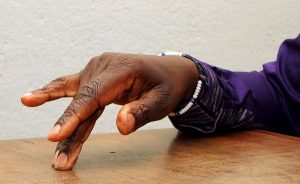26 Oct Technodiction

I used to begin my day with a cigarette and a cup of a coffee. Now I begin my day with a meditation and a cup of coffee. But I have to admit, increasingly I can see that my day often begins with looking at one of my devices.
How many of you begin your day with the cell phone, the iPad, or the computer?
I was asked to do some training on digital addiction with some artists and geeks, and I was alarmed after some research to realize that I too am teetering into digital addiction.
If we rely on the dictionary definition of addiction, ‘the fact or condition of being addicted to a particular substance, thing or activity, or a dependency, dependence, habit or problem’, we can at least begin to entertain the idea that many of us fall into the category of digital addiction.
You might be saying: “What’s the issue, it’s not a matter of life and death?” Sadly the number of road accidents caused by using the cell phone is on the increase, and that means more lives taken due to this insidious addiction. It’s illegal in many places to text and drive, or to be talking on the phone if you’re not hands-free, and yet we still do it, despite the fact we are putting our life and others’ at risk. Another definition of addiction is continuing a habitual behaviour despite the negative consequences. And texting while driving can be a matter of life and death.
So why are many of us prey to this new addictive habit?
Digital technology is seductive. When we hear that ping on one of our gadgets it’s almost like candy for the brain. Messages can make us think we are needed and wanted, and they encourage us to stay online. The more ‘likes’ we receive on our posts, the more pumped-up our self esteem becomes.
Facebook has recently introduced emoticons — a heart, a thumbs up, a smile — all of which can be experienced as affirming. Other emoticons, like a scowl, angry face or tears, can potentially deflate our egos. We can have a false sense of thinking we know what others are thinking and feeling. However for many people Facebook provides a sense of connection, even if they are alone at home staring at a screen. When it’s our birthday we can receive hundreds of messages. Before the advent of Facebook some of us would have been lucky if we received more than three birthday cards.
Technology has been designed to appeal to our senses. Games such as Candy Crush are replicated in the supermarket, and become as addictive as cigarettes and sugar. So many urban environments are digitalized that even if we don’t own a device we can still experience a cognitive overload from all the digital images we are surrounded by.
There is also the overload of emails. Some people spend half their working day attending to their inbox, Linkedin, Twitter, Instagram, Snapchat accounts. Many of us check our social media accounts ten or more times a day.
So what can we do?
There is a company called Unless I Hear Differently that offers a simple tip to improve communication. If you are trying to make a decision over email and people are not getting back to you, this company suggests you write the phrase, “Unless I hear differently, this is what I’m going to do…” This phrase can cut down a whole slew of emails if you are trying to make a decision. It fosters a bias for action without weeks of trying to get an agreement.
Here is a list of other things you can do to help you live more peacefully in this digital era:
- Put your phone on airplane mode while you are working
- Put your phone on silent
- Close the your browser on your lap top
- Put your email autoresponder on for a couple of hours
- Disconnect your phone from your lap top, iPad, or computer so you do not hear the ping every time someone sends you a message
Try one of these and see what happens. Perhaps you will find out just how attached you are to your gadget.
The next time you wake up to checking your messages on a device, consider buying one of those old fashioned alarm clocks to wake you up.
I will be delivering an online Mindfulness Based Addiction Recovery course during the month of January 2018. For people in recovery and people working in the field of recovery. For more information please email mark@wildmind.org



